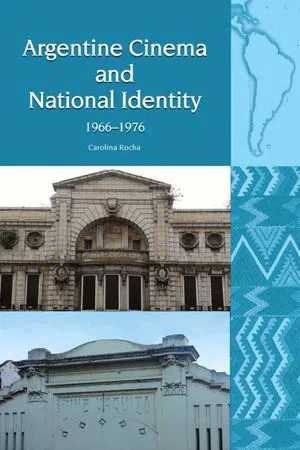
- English
- PDF
- Available on iOS & Android
Argentine Cinema and National Identity : 1966-1976 (Volume 16)
About this book
Argentine Cinema and National Identity covers the development of Argentine cinema since the late 1950s to the mid-1970s, a period that has been understudied. This essential cultural history delves on the dialect tradition versus modernity that was in place during those years and also comprises an examination of the political economy of film production as well as the different laws, including that implementing censorship that regulated this cultural industry. It also pays particular attention to two historical film genres: the historical film genre per se and the gauchesque, a genre based on outlaw gauchos that was crucial for nation-building in the nineteenth century. This volume investigates the way Argentine cinema positioned itself when facing the competition of glossy American films and resorted to the historical and gauchesque to bridge the stark divisions between the Argentine left and right in the late 1960s.
Frequently asked questions
- Essential is ideal for learners and professionals who enjoy exploring a wide range of subjects. Access the Essential Library with 800,000+ trusted titles and best-sellers across business, personal growth, and the humanities. Includes unlimited reading time and Standard Read Aloud voice.
- Complete: Perfect for advanced learners and researchers needing full, unrestricted access. Unlock 1.4M+ books across hundreds of subjects, including academic and specialized titles. The Complete Plan also includes advanced features like Premium Read Aloud and Research Assistant.
Please note we cannot support devices running on iOS 13 and Android 7 or earlier. Learn more about using the app.
Information
Table of contents
- Cover
- Contents
- Acknowledgments
- Introduction
- Section I: Argentine History and National Cinema, 1955–1976
- Section II: The Cinematic Gauchesque
- Section III: Representing Founding Fathers
- Conclusion
- Bibliography
- Index